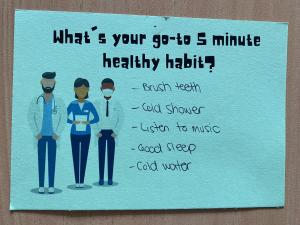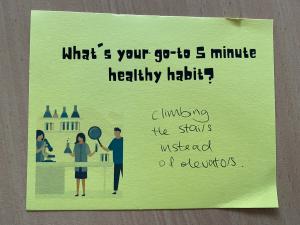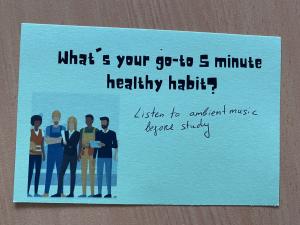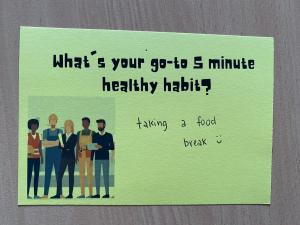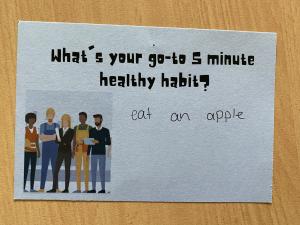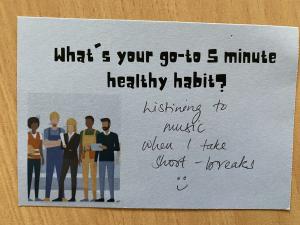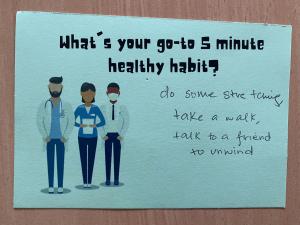Exam Wellbeing

With a few study tips and strategies to manage your wellbeing, exam time doesn't have to fill you with dread.
Around major assessments or tests, it's normal to feel stressed. We are being asked to demonstrate what we know, often under time pressured conditions, and the outcome is important to our degree progression. When we can't accurately predict how we'll perform, our fight or flight system activates and we are often left feeling nervous or anxious.
Frequently suggested strategies
Explore tips to help you revise and manage the stress of exam day.
-
Revision tips
- Write out everything you know about a particular topic first - this helps you determine where to focus your revision
- Find a calendar and write or type out a revision schedule
- Don't leave study until the last minute so you can avoid 'all-nighters'
- Plan to study when your energy is high so you can sleep in tune with your Circadian rhythm
- Find a study spot that works for you
- Study in an environment that cues concentration - somewhere like the library
- Take regular breaks - 10 minutes every hour is a good guide
- Reduce distractions - keep your phone in your bag, explore app blockers or use headphones or earplugs
- Talk to classmates or post questions on class noticeboards
- Ask for help - connect with Studiosity, the Writing Centre or the Maths Learning Centre.
International Student Support are teaming up with the Examinations and Results Office and Student Academic Skills Office for a workshop on exam stress management, Wednesday 1 June, 2.30pm. With free food and a wealth of knowledge on offer, this is not to be missed.
-
Exam day tips
- Visit the exam venue a few days before so you know how to get there
- Plan your journey and have a back up option
- Don't rush - set an alarm to wake up with enough time to get ready
- Eat something the morning of the exam to support your energy levels
- Stay hydrated - bring water with you and sip before and during the exam
- Decide if you prefer to wait alone or with friends
- Have a strategy for tackling the paper
- Underline key words in the questions on the exam paper
- Try easier questions first to build confidence and stimulate thinking for more difficult answers
- Stay until the end of the exam and use the time to check or enhance answers
- If you feel panicked or nervous, spend a few minutes pushing your feet into the ground, breathing into your belly and counting your breaths.
- Remind yourself, "I am competent, I am capable, I can do this"
Blocks
Below you will find three common blocks (barriers and misconceptions) that can minimise our exam success.
-
I am not good at exams
Exams and assessments can be really challenging. They are pressured situations in which most people feel nervous or anxious. The skills to successfully sit exams aren't innate and can be learned. There is no substitute for preparation and revision but we can learn to do these things more effectively through managing our time, taking regular breaks and testing our knowledge in advance.
Learning how to breath, talk encouragingly to ourselves and step back for a different perspective don't eliminate exam stress or anxiety. However, these skills help reduce these feelings allowing us to perform on the day to the best of our ability.
-
I don't have time to take a break
When we have a lot of revision to do, it is often tempting to work as hard as we can. This might mean that we don’t take breaks and give ourselves time to rest and feel refreshed. If we feel "burnt out", it's hard to focus and can increase stress levels, particularly as exams approach. Taking even 5 minutes every hour to get up from your desk, stretch and move around can really help.
-
I'll start revising tomorrow
Sometimes when we feel overwhelmed and stressed with an assignment or impending exam, it's hard to get started. We may be waiting to feel ready or in the "right mood" to begin. Instead of putting your energy into avoiding revision, ask yourself "what do I need to study now?" Can you commit to 5 minutes of revision? It might also be a good time to explore the resources available to help you study. Studiosity is a free, after-hours online study tool for all UoA coursework students available through MyUni. Or reach out to campus supports like the Maths Learning Centre or Writing Centre.
Boosters
Below are three things you can do to boost success
-
Make a revision plan that works for you
If this is your first semester, it's normal to feel nervous about revision and exams. Start by making a realistic plan and identifying what you need to focus on. There are some great tips from both the Writing Centre and Maths Learning Centre.
Some self reflection is also a useful activity - how do you study best? Is a quiet environment, or listening to background noise? When do you work best? Are you a morning person or do you study best in the evening? There is no perfect study schedule so whilst it's useful to find out how friends approach their study, it's also OK if the same routine doesn't work for you.
When you know the answers to these questions, write your plan out on a piece of paper. It helps assess how realistic it is, keep us on track and remove the mental load associated with thinking "what am I supposed to be doing now?".
-
Make a plan for exam day
Rehearsing or planning something in our mind often helps to reduce anxiety. Although there will still be things we can't control, we can control the time we wake up, what we eat for breakfast, the time we leave for the exam, how we encourage ourselves to do our best. Visualising yourself sitting in the exam hall and opening the paper whilst breathing into your belly and reminding yourself "I can only do my best" is a strategy worth exploring.
-
Plan something to look forward
Revision and exams come at the end of most semesters meaning we are already fatigued from assignments! To help us sustain motivation, it can be useful to plan a fun activity for after the exams conclude. This is more than a vague notion of doing 'something' but rather a plan that we can look forward to and get excited about. When we feel demotivated or distracted, reminding ourselves of the 'reward' waiting after exams can help get us back on track - why not try it?
Tips from your peers
During Health Week, we asked "what are your go-to healthy habits? Check out the suggestions from students across all 3 Faculties and add some to your wellbeing toolkit this exam season.
- "Stop whatever I'm doing and breathe, go for a short walk, call my parents, talk to someone and take showers"
- "Set a reminder to drink water each hour"
- Walking from AHMS to my bus stop instead of taking the tram"
- "Taking the stairs instead of the elevator"
- "I love to journal and write down all the things I am grateful for. A good 5 minute habit for when you feel sad or anxious"
- "Do the superwoman pose in the mirror and tell myself I can do it to boost my confidence"
- "Walking away from study for 5 minutes to clear your head"
- "Brush teeth, cold shower, listen to music, good sleep and cold water"
Need more info?
- The University of Adelaide Writing Centre and Maths Learning Centre have exam specific tips and advice.
- Consider reviewing some of the material in the following booklets:
- Review top tips from Headspace on how to reduce stress and prepare for exams
- Check out the resources tab on the Study Tips page.








